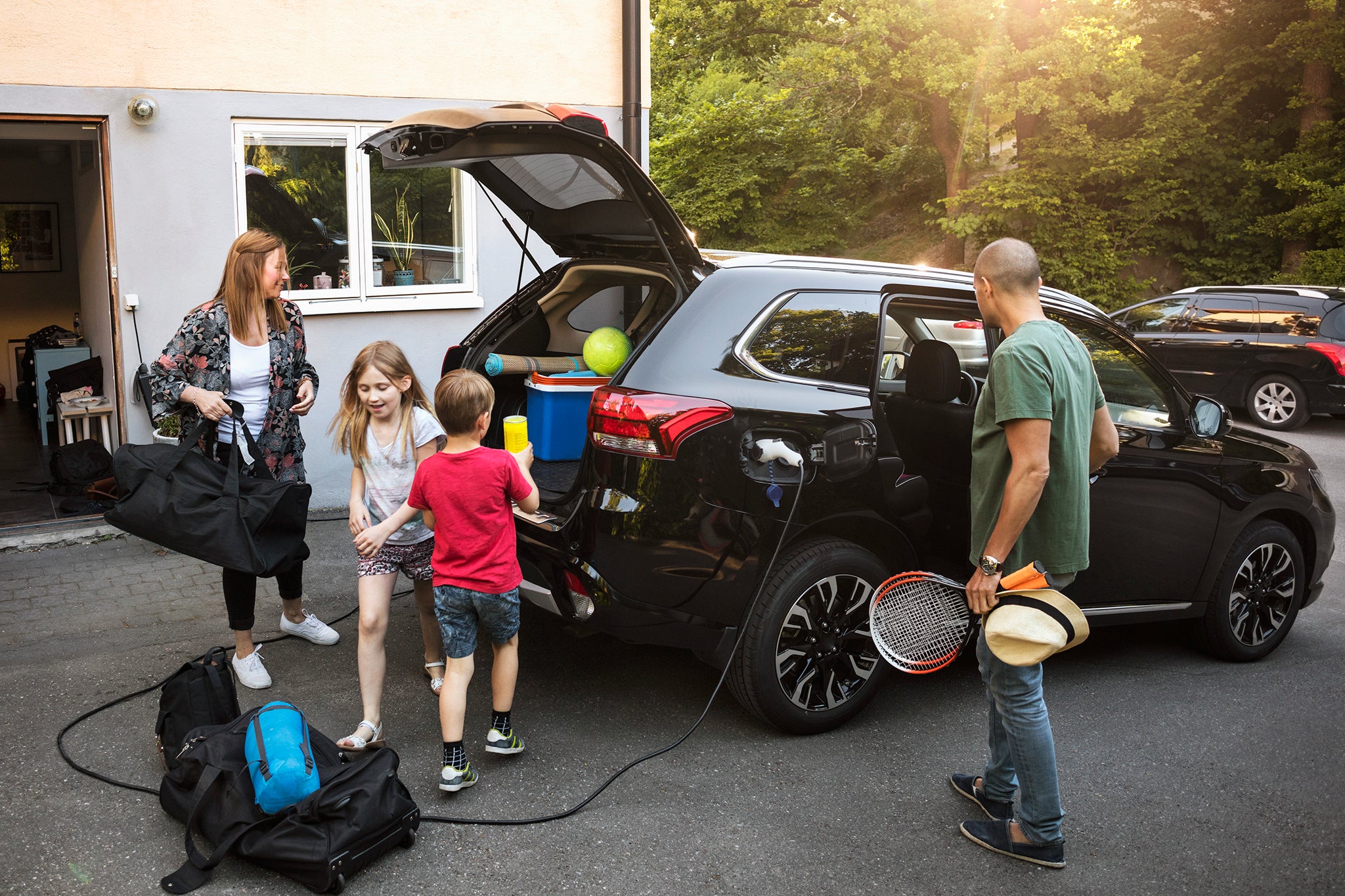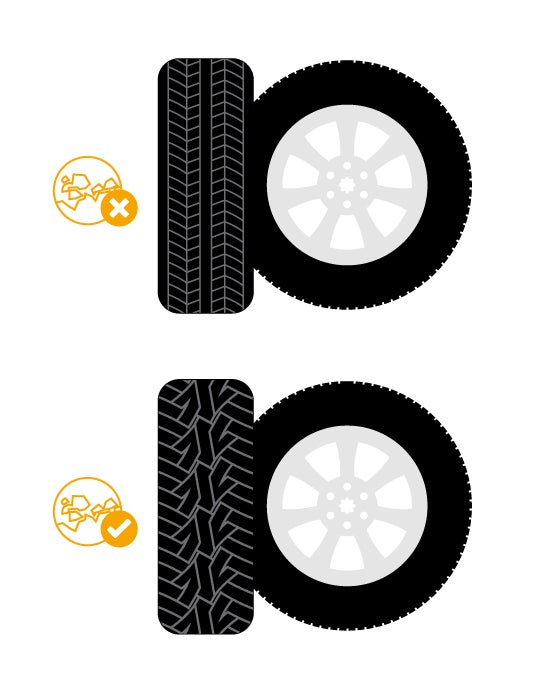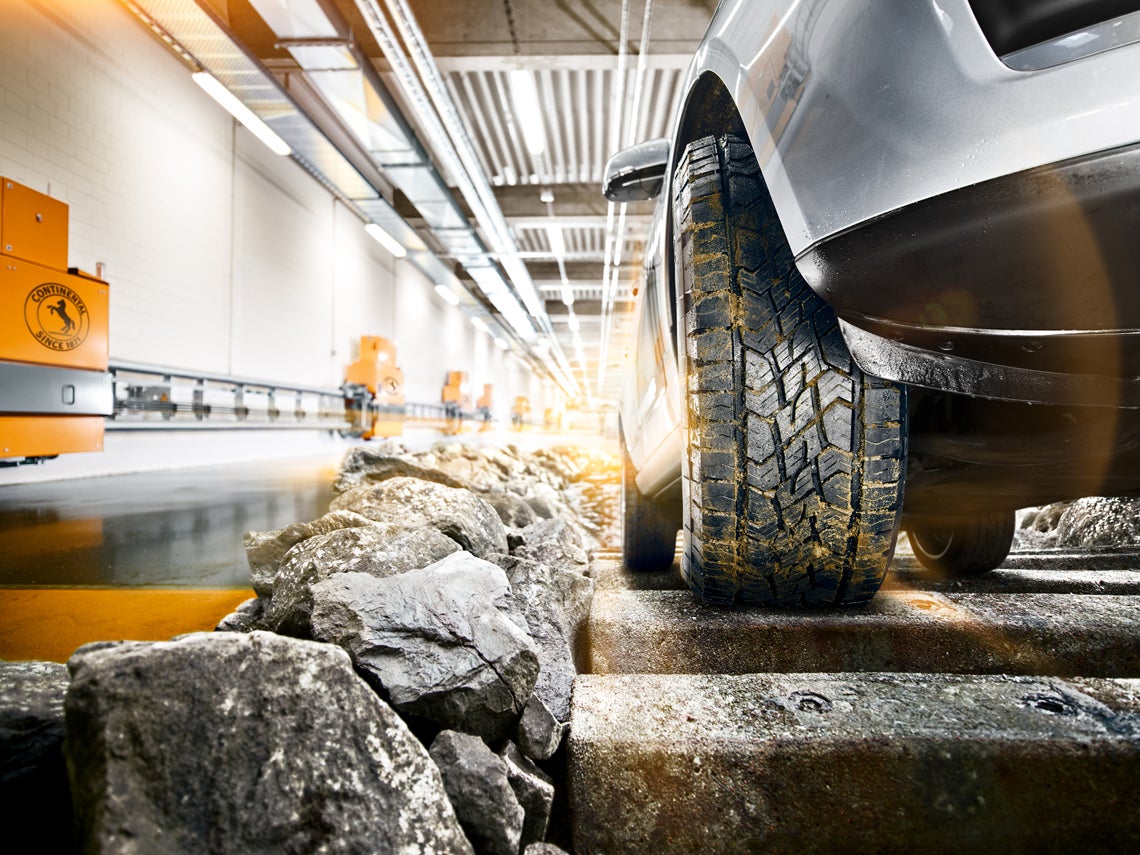
# Tire Basics
Can I take my SUV off-road?
Serious off-roaders need 4WD and all-terrain tires
In general, most SUVs can go off-road, at least to a certain degree. For serious off-road performance, sport utility vehicles with four-wheel drive and specifically engineered off-road tires can tackle pretty much any terrain. However, if you are only planning on hitting the odd dirt track once in a while, you’ll probably manage in a crossover SUV with all-wheel drive and all-terrain or maybe even on-road tires.
For more background on the difference between four-wheel and all-wheel drive, read this explainer.
Next, make sure you know the conditions well and have the right tires before you choose the road less traveled...

Off-roader tire types
You can get away with a certain amount of off-road driving with on-road tires, even if your vehicle only has two-wheel drive, as long as the surface is as close to that of a paved road as possible. For example, a well-compacted dirt track to your weekend mountain hut, the gravel lane that leads to a remote campsite and a forest path to the start of a hike through a national park are all fair game. However, you need to be certain that the condition of the track is good for several reasons:

- Two-wheel drive will lose traction as soon as the ground gets too uneven or the surface is shifting and insecure.
- Sport utility vehicles that aren’t off-road-ready usually have a stiffer suspension, which can break under extreme conditions like a pothole-riddled unpaved road.
- On-road SUV tires are designed for optimum performance on paved roads. Their smooth tread, low rolling resistance and smaller contact patch contribute to fuel-efficiency on tarmac, but offer reduced grip on unpaved roads.
- The smaller grooves between the tread blocks are not self-cleaning can become clogged with stones, gravel and mud, reducing grip and traction even further.
- On-road tire sidewalls are not reinforced the same way off-road tires are, so larger rocks or other obstacles could cause significant damage, leading to a flat tire.
For anything beyond the bare minimum of off-road driving, even if it’s only on unsurfaced roads, all-wheel drive and all-terrain tires designed for on/off-road use are the best choice.
The right tires for serious off-road driving
If you are planning on really going where no roads can find you, only a four-wheel drive with specific engineered off-road tires like multi-terrain, all-terrain or mud-terrain tires will do. Whether you are rock-crawling, dune-bashing, plowing through mud or deep snow, you need a heavy-duty vehicle that is built for the task. Here’s how to choose the right tires for your vehicle with the help of the Continental tire finder: [link to Tire finder]
- Like all cars, sport utility vehicles require the right tire size, and the right tires for the season.
- Once you have entered the required tire size and selected summer or winter tires, you will see a list of suitable models. You can choose between the CrossContact™RX and CrossContact™ ATR, ContiCrossContact™ LX Sport, ContiCrossContact™ LX ranges, which all offer off-roading abilities to varying degrees.
- Your choice will be determined not only by the type of driving you plan to do, but also by the ratio of off/on-road driving.
- For example, while the ContiCrossContact™ LX offers outstanding traction in light off-road use while also performing well on paved roads, it isn’t quite as well suited to serious rock crawling.
- The CrossContact™ ATR , on the other hand, is designed with durability, off-road traction and grip on various off-road surfaces such as gravel and mud, which makes it less fuel-efficient for extended highway driving.
- Your nearest retailer can help you find a tire that strikes the perfect balance between on-road performance and off-road abilities. [link to Dealer locator]
Dos and don’ts of taking your SUV off-road…
Do not:
- Don’t go off-road in an SUV that isn’t designed for the conditions.
- Don’t go off-road with tires that aren’t designed for the conditions.
Do:
- Do your research and make sure you know the conditions, as well as the right tires for the terrain.
- Find out the condition of the track before setting out (in case it has been affected by recent weather events).
- Check the tire pressure, which usually needs to be lowered before venturing into rocky, muddy or sandy territory.
- Check the tire tread and sidewall for damage before and after off-roading.
- Carry an emergency kit, especially in more remote areas.
Related content
-
 2024/10/17SUV TiresIf you're looking for new SUV tires, there are several things to consider to ensure safety and quality.Read more
2024/10/17SUV TiresIf you're looking for new SUV tires, there are several things to consider to ensure safety and quality.Read more -
 2024/10/17Four-wheel driveNot all SUVs have four-wheel drive, but the terms often overlap or are used synonymously. We explain the difference between SUV, 4WD and AWD.Read more
2024/10/17Four-wheel driveNot all SUVs have four-wheel drive, but the terms often overlap or are used synonymously. We explain the difference between SUV, 4WD and AWD.Read more -
 2024/10/17Off-road tiresIf you're planning on driving off the trail with your car, truck or SUV, you need tires which are appropriate for a whole new set of challenges.Read more
2024/10/17Off-road tiresIf you're planning on driving off the trail with your car, truck or SUV, you need tires which are appropriate for a whole new set of challenges.Read more
